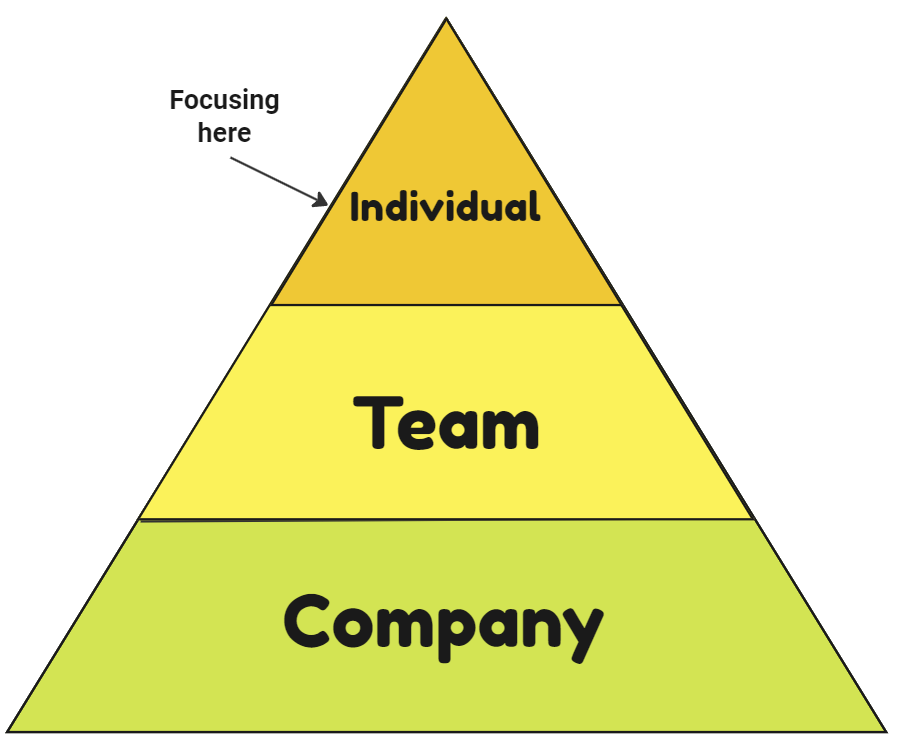The manager’s guide to nurturing individual happiness and driving success

Whether you’re a budding manager or a seasoned pro, this article uncovers the essential principles of successful managers, focusing on the first tenet of the manager’s job: making individuals happy and productive. By honing in on this aspect, we unlock the potential of individuals, thereby nurturing happy and productive teams that bring immense value to the company. As an engineering leader at Google for nine years, I penned this piece to articulate my managerial philosophy succinctly and set the bar for 14 managers under my wing.
Reminder: The manager’s job is
Help individuals be happy and productive so they can form happy and productive teams that deliver value to the company (through software).
Revolving around three fundamental tenets:

Read here for the overarching three core tenets and how managers add value.
The Manager Trinity: The 3 Tenets of Successful Management
As noted, this tenet comprises hiring, firing, mentoring, guiding, coaching, managing performance, and fostering growth. To succeed here, you must develop and show genuine care about the people you work with and take action to help them succeed.
Developing and supporting individuals
In this critical aspect of your role, you’ll engage in a range of vital tasks:
Hiring: Attracting top talent that aligns with company and team needs while ensuring cultural fit and potential for growth.
Finding and attracting the best talent for your team is crucial. You want to hire people with the right skills (matching the company and team needs), experience level, cultural fit, and growth potential.
An example of cultural fit is noticing your team is more extroverted or introverted and balancing that out.

Fostering growth: Identify your team members’ personal and career aspirations, and coach them toward reaching their goals through skill-building opportunities and meaningful projects. Help them be the best version of themselves as they see it.
An anecdote on “best version of themselves, as they see it”: I had a report who was in the same seniority level for many years, a solid performer, consistently meeting expectations. One performance cycle, he was demonstrating some aspects of what we defined as “exceeding expectations.”
In my desire to be a transparent and guiding manager, I mentioned that in his performance review and suggested ways for him to reach “exceeding expectations.” Two weeks after I shared his performance review, he asked to meet. To my surprise, he (kindly and lightly) scolded me for pushing him to perform in a way he wasn’t interested in.
While most people want to grow professionally in seniority, some are happy where they are. Talk to your reports to understand their motivation and aspirations.
Managing performance: Managing performance is a cornerstone of effective leadership, involving clear and realistic goal-setting and providing regular, constructive feedback. Be proactive in addressing performance issues before they escalate. Many managers shy away from these conversations due to uncertainty and fear. However, it’s crucial to address low performance promptly.
I once had a team member who struggled to deliver despite their amiable demeanor. Despite recognizing the challenges, I hesitated to take decisive action, resulting in prolonged team-wide effects. That taught me the importance of confronting my fears and leaning into action — creating an action plan and generating an audit log of conversations.
Facing these challenges head-on will ensure a successful and thriving team.

Embracing diversity
Be intentional and thoughtful about injecting diversity of opinions, backgrounds, and perspectives. Diversity of brains is proven to drive innovation and yield better outcomes. It also makes work much more interesting and fun.
Cultural fit matters, and you’ll want to create a harmonious balance within your team, considering team members’ personalities in addition to professional skills and experience (e.g., balancing extroversion and introversion).
Beyond that, be purposeful in fostering a diverse team with varied opinions, backgrounds, and perspectives. Embracing this diversity of brains fosters innovation and drives superior outcomes, making work both engaging and enjoyable.
Navigating firing
Firing is undoubtedly one of the most emotionally difficult aspects of being a manager. The bonds formed between us and our team members make the thought of causing them and their families pain weigh heavily on our hearts.
However, we must remember that most low performers don’t intend to be in such a position. Often, they find themselves stuck or unsure of the way forward. Mastering the courage to address low performance can lead to positive outcomes for the team. Sometimes, it even opens doors to more fitting roles where they can truly thrive.
Recognize that low performers, even unintentional ones, can have a detrimental impact on their peers, consuming valuable resources and affecting team dynamics. Peers might mimic their behaviors, mistaking them to be acceptable. Ineffective management can lead to team members leaving or seeing you as an ineffective leader.
As a manager, it’s your responsibility to ensure your team is set up for success by addressing performance issues head-on.

Fostering feedback
Create an open and honest feedback culture where honesty and authenticity thrive, promoting a healthier work environment.
In your one-on-one meetings, make “bi-directional feedback” the starting point. Regularly offer timely and actionable feedback while inviting feedback from your team. This commitment to continuous improvement demonstrates your willingness to adapt your management style for better team support.
In hiring, encourage candidates to connect with your team for candid insights. The happiness of your team members will attract top talent and streamline the hiring process. Managers tend to paint a rosy picture; individuals offer an authentic view that helps candidates make well-informed decisions.
Continuous learning and mentorship — for you!
As you progress in this managerial journey, remember that no one knows it all from the start. Seek guidance from seasoned managers who excel in areas you wish to grow in. Their insights and advice will be invaluable in shaping your leadership style.
Sharing your questions helps me match future articles to your interests; sharing what I’ve learned through your comments will make us all better managers.
The Manager Trinity: Productive Individuals was originally published in Better Programming on Medium, where people are continuing the conversation by highlighting and responding to this story.